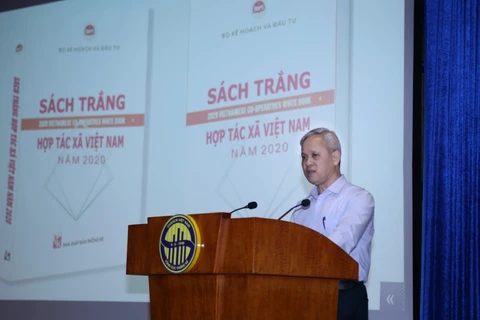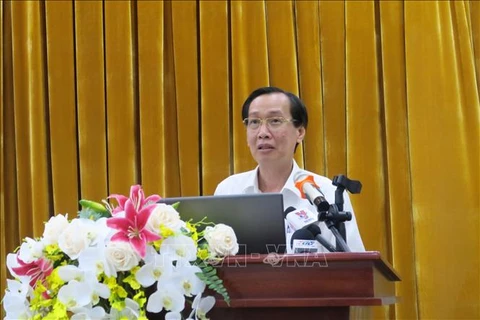HCM City (VNS/VNA) - Although the collective economy in Ho Chi Minh City has gained positive results, limitations still exist, district officials and cooperative leaders have said.
According to the HCM City Cooperative Alliance, the number of cooperatives has increased considerably and their quality has improved over the past five years. The number of cooperatives rose from 69 in 2015 to 112 this year, with a total of 2,551 members.
Cooperatives, particularly agricultural ones, focus on supporting household economies by providing services or jobs for members.
Cu Chi district has the highest number of agricultural cooperatives, with 38 out of a total 50 operating in the district.
In the first half of the year, despite COVID-19, agricultural cooperatives’ revenue was estimated at 80 billion VND (3.45 million USD), and the average monthly income was more than 5 million VND (216 USD) per person.
Le Dinh Duc, Vice Chairman of the Cu Chi District People's Committee, said these achievements were thanks to agricultural cooperatives enhancing linkages with commercial cooperatives and supermarket chains to ensure stable outlets for products produced by members. Many products have also been exported, he said.
For instance, the Saigon Aquarium Cooperative is a major provider of baby ornamental fish and breeding techniques. It buys all ornamental fish from breeders to sell in the domestic market or for export, creating jobs for about 200 households.
To exploit the potential of the island district of Can Gio, Truong Tien Trien, Vice Chairman of the People's Committee of Can Gio district, said a district-based shrimp cooperative and the Centre for Hi-tech Agricultural Research and Development have implemented an experimental super-intensive shrimp farming model to produce safe and high-nutritional shrimp products.
This has helped to satisfy strict quality standards set by fastidious markets such as the US, EU, and Japan, he said.
Despite positive results, the development of cooperatives has not met their potential, Duc said.
Most cooperatives are small with limited funds, lack business strategies, have poor management compared with other economic sectors, and are disadvantaged in an integrated economy.
The capacity and skills of management staff in the cooperatives are limited, making it difficult to meet demand in the market economy.
To boost the development of the collective economy, the city Department of Agriculture and Rural Development has set up a preferential credit policy to encourage cooperatives to invest in cultivating or breeding high-value plants or animals.
The average loan for a qualified project increased from 269 million VND in the 2011-2015 period to 533 million VND in the 2016-2020 period.
“Lack of investment capital for production and business activities is a major barrier to the development of cooperatives,” Duc said. "With their small scale, they find it hard to get loans from credit institutions since they don’t have assets to mortgage."
He suggested that the Government promote administrative reform, shorten the time needed to implement procedures related to licensing and tax policy, and simplify procedures for supporting cooperatives in borrowing capital, among others.
A representative of Binh Chanh district said the HCM City Cooperative Alliance should continue to help cooperatives train personnel and regularly hold professional training courses on economic management, finance and accounting, market research, and project management.
In addition, leaders of districts suggested that the Department of Agriculture and Rural Development use database management software to facilitate management and investigation of cooperatives in the agricultural sector.
To improve the efficiency of the collective economic model, in the 2021-2030 period the city will focus on developing a new-style cooperative model. It also targets setting up 300 cooperatives and five unions of cooperatives, according to the city People's Committee said.
The sector is expected to achieve annual growth of 7 percent, accounting for 0.6 percent of the city’s economy, and create 30,000 jobs each year.
The city also seeks to raise the ratio of cooperative leaders with college and university degrees to 60 percent.
To achieve these targets, the city will implement a number of measures such as increasing the capital of the City Cooperative Member Support Fund to 2 trillion VND (86.4 million USD) by 2030.
It will also continue to connect credit organisations and cooperatives, provide training to cooperative managers, and promote their products and improve their technologies./.
VNA

























